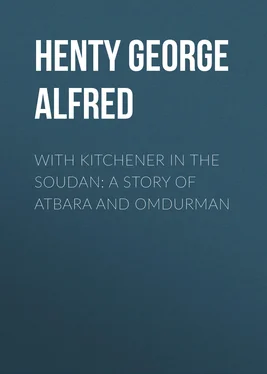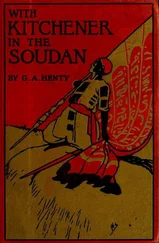George Henty - With Kitchener in the Soudan - A Story of Atbara and Omdurman
Здесь есть возможность читать онлайн «George Henty - With Kitchener in the Soudan - A Story of Atbara and Omdurman» — ознакомительный отрывок электронной книги совершенно бесплатно, а после прочтения отрывка купить полную версию. В некоторых случаях можно слушать аудио, скачать через торрент в формате fb2 и присутствует краткое содержание. Жанр: Прочие приключения, Прочие приключения, foreign_antique, foreign_prose, foreign_children, на английском языке. Описание произведения, (предисловие) а так же отзывы посетителей доступны на портале библиотеки ЛибКат.
- Название:With Kitchener in the Soudan: A Story of Atbara and Omdurman
- Автор:
- Жанр:
- Год:неизвестен
- ISBN:нет данных
- Рейтинг книги:5 / 5. Голосов: 1
-
Избранное:Добавить в избранное
- Отзывы:
-
Ваша оценка:
- 100
- 1
- 2
- 3
- 4
- 5
With Kitchener in the Soudan: A Story of Atbara and Omdurman: краткое содержание, описание и аннотация
Предлагаем к чтению аннотацию, описание, краткое содержание или предисловие (зависит от того, что написал сам автор книги «With Kitchener in the Soudan: A Story of Atbara and Omdurman»). Если вы не нашли необходимую информацию о книге — напишите в комментариях, мы постараемся отыскать её.
With Kitchener in the Soudan: A Story of Atbara and Omdurman — читать онлайн ознакомительный отрывок
Ниже представлен текст книги, разбитый по страницам. Система сохранения места последней прочитанной страницы, позволяет с удобством читать онлайн бесплатно книгу «With Kitchener in the Soudan: A Story of Atbara and Omdurman», без необходимости каждый раз заново искать на чём Вы остановились. Поставьте закладку, и сможете в любой момент перейти на страницу, на которой закончили чтение.
Интервал:
Закладка:
As the officers who had come up with them in the train from Cairo were all going on, and had been told by Ewart something of Gregory's story, they had aided that officer in making Gregory feel at home in his new circumstances; and in the two days they had been on board the boat, he had made the acquaintance of several others.
The river railway had now been carried from Wady Halfa to Kerma, above the third cataract. The heavy stores were towed up by steamers and native craft. Most of the engines and trucks had been transferred to the desert line; but a few were still retained, to carry up troops if necessary, and aid the craft in accumulating stores.
One of these trains started a few hours after the arrival of the steamer at Wady Halfa. Gregory, with the officers going up, occupied two horse boxes. Several of them had been engaged in the last campaign, and pointed out the places of interest.
At Sarras, some thirty miles up the road, there had been a fight on the 29th of April, 1887; when the Dervish host, advancing strong in the belief that they could carry all before them down to the sea, were defeated by the Egyptian force under the Sirdar and General Chermside.
The next stop of the train was at Akasheh. This had been a very important station, before the last advance, as all the stores had been accumulated here when the army advanced. Here had been a strongly entrenched camp, for the Dervishes were in force, fifteen miles away, at Ferket.
"It was a busy time we had here," said one of the officers, who had taken a part in the expedition. "A fortnight before, we had no idea that an early move was contemplated; and indeed, it was only on the 14th of March that the excitement began. That day, Kitchener received a telegram ordering an immediate advance on Dongola. We had expected it would take place soon; but there is no doubt that the sudden order was the result of an arrangement, on the part of our government with Italy, that we should relieve her from the pressure of the Dervishes round Kassala by effecting a diversion, and obliging the enemy to send a large force down to Dongola to resist our advance.
"It was a busy time. The Sirdar came up to Wady Halfa, and the Egyptian troops were divided between that place, Sarras, and Akasheh. The 9th Soudanese were marched up from Suakim, and they did the distance to the Nile (one hundred and twenty miles) in four days. That was something like marching.
"Well, you saw Wady Halfa. For a month, this place was quite as busy. Now, its glories are gone. Two or three huts for the railway men, and the shelters for a company of Egyptians, represent the whole camp."
As they neared Ferket the officer said:
"There was a sharp fight out there on the desert. A large body of Dervishes advanced, from Ferket. They were seen to leave by a cavalry patrol. As soon as the patrol reached camp, all the available horse, two hundred and forty in number, started under Major Murdoch. Four miles out, they came in sight of three hundred mounted Dervishes, with a thousand spearmen on foot.
"The ground was rough, and unfavourable for a cavalry charge; so the cavalry retired to a valley, between two hills, in order to get better ground. While they were doing so, however, the Dervishes charged down upon them. Murdoch rode at them at once, and there was a hand-to-hand fight that lasted for twenty minutes. Then the enemy turned, and galloped off to the shelter of the spearmen. The troopers dismounted and opened fire; and, on a regiment of Soudanese coming up, the enemy drew off.
"Eighteen of the Dervishes were killed, and eighty wounded. Our loss was very slight; but the fight was a most satisfactory one, for it showed that the Egyptian cavalry had, now, sufficient confidence in themselves to face the Baggara.
"Headquarters came up to Akasheh on the 1st of June. The spies had kept the Intelligence Department well informed as to the state of things at Ferket. It was known that three thousand troops were there, led by fifty-seven Emirs. The ground was carefully reconnoitred, and all preparation made for an attack. It was certain that the Dervishes also had spies, among the camel drivers and camp followers, but the Sirdar kept his intentions secret, and on the evening of June 5th it was not known to any, save three or four of the principal officers, that he intended to attack on the following morning. It was because he was anxious to effect a complete surprise that he did not even bring up the North Staffordshires.
"There were two roads to Ferket–one by the river, the other through the desert. The river column was the strongest, and consisted of an infantry division, with two field batteries and two Maxims. The total strength of the desert column, consisting of the cavalry brigade, camel corps, a regiment of infantry, a battery of horse artillery, and two Maxims–in all, two thousand one hundred men–were to make a detour, and come down upon the Nile to the south of Ferket, thereby cutting off the retreat of the enemy.
"Carrying two days' rations, the troops started late in the afternoon of the 6th, and halted at nine in the evening, three miles from Ferket. At half-past two they moved forward again, marching quietly and silently; and, at half-past four, deployed into line close to the enemy's position. A few minutes later the alarm was given; and the Dervishes, leaping to arms, discovered this formidable force in front of them; and at the same time found that their retreat was cut off, by another large body of troops in their rear; while, on the opposite bank of the river, was a force of our Arab allies.
"Though they must have seen that their position was hopeless, the Dervishes showed no signs of fear. They fought with the desperation of rats in a trap. The Egyptians advanced with steady volleys. The Baggara horsemen attacked them furiously, but were repulsed with heavy loss. There was hand-to-hand fighting among their huts; and the second brigade carried, with the bayonet, that rough hill that you see over there.
"It was all over, by seven o'clock. Our loss was only twenty killed, and eighty wounded. About one thousand of the Dervishes were killed, including their chief Emir and some forty of the others, while five hundred were taken prisoners. It was a great victory, and a very important one; but it can hardly be said that it was glorious, as we outnumbered them by three to one. Still, it was a heavy blow to the Dervishes, and the fact that the Khalifa was obliged to send troops down to the Nile, to check an advance that had proved so formidable, must have greatly relieved the pressure on the Italians at Kassala.
"There was a pause, here. It was certain that we should have to meet a much stronger force before we got to Dongola. Well as the Egyptian troops had fought, it was thought advisable to give them a stronger backing.
"The heat was now tremendous, and cholera had broken out. We moved to Koshyeh, and there encamped. The only change we had was a terrific storm, which almost washed us away. In the middle of August, we managed to get the gunboats up through the cataract, and were in hopes of advancing, when another storm carried away twenty miles of the railway, which by this time had come up as far as the cataract."
At Ginnis, twenty miles from Ferket, they passed the ground where, on the 31st of December, 1885, on the retirement of General Wolseley's expedition, Generals Grenfel and Stevenson, with a force of Egyptian troops and three British regiments, encountered the Dervish army which the Khalifa had despatched under the Emir Nejumi, and defeated it. It was notable as being the first battle in which the newly raised Egyptian army met the Mahdists, and showed that, trained and disciplined by British officers, the Egyptian fellah was capable of standing against the Dervish of the desert.
From this point the railway left the Nile and, for thirty miles, crossed the desert. Another twenty miles, and they reached Fareeg.
Читать дальшеИнтервал:
Закладка:
Похожие книги на «With Kitchener in the Soudan: A Story of Atbara and Omdurman»
Представляем Вашему вниманию похожие книги на «With Kitchener in the Soudan: A Story of Atbara and Omdurman» списком для выбора. Мы отобрали схожую по названию и смыслу литературу в надежде предоставить читателям больше вариантов отыскать новые, интересные, ещё непрочитанные произведения.
Обсуждение, отзывы о книге «With Kitchener in the Soudan: A Story of Atbara and Omdurman» и просто собственные мнения читателей. Оставьте ваши комментарии, напишите, что Вы думаете о произведении, его смысле или главных героях. Укажите что конкретно понравилось, а что нет, и почему Вы так считаете.












